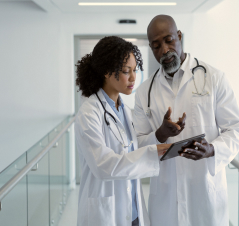LIVE FROM ACOFP ‘24, A CONVERSATION WITH:
Carol Penn, DO, MA, DABOM, FACOFP
S. Ama Wray, MA, PhD
Dele Olajide, MD, PhD, FRCPsych
May 31, 2024
“Life is an improvisation.”
This is how the 61st Annual Convention presentation began.
Dr. Penn introduced audiences to the body-centric practice of Embodiology, a methodology based on West African principles of human communications. Its distinctive breath-informed, rhythmic movement and music concepts have shown efficacy in elevating vitality, well-being, resilience, and creativity.
The principles of Embodiology align to those of osteopathic medicine, shared Dr. Penn:
- Principle 1 – the body as unit and the person as a unit of mind, body spirit
- Principle 2 – the body is capable of self-regulation, self-healing and health maintenance
- Principle 3 – Structure and function are reciprocally interrelated
- Principle 4 – Together, Rational treatment is based upon an understanding of the basic principles of body, unity, self-regulation and the interrelationship of structure and function
Now, more than ever, there are crushing external, environmental impacts on physicians – from global politics to climate change to shifts in patient needs. If “the physician is the patient’s first dose of medicine,” as Dr. Penn shared, how do you listen deeply? And first, how do you listen to yourself and what your body needs?
The session on Embodiology aimed to remind physicians that caring for themselves is necessary to effectively care for patients. Dr. Wray, the founder of the movement, encouraged attendees to, at a minimum, incorporate diaphragmatic breathing into their own daily routine. As Swami Rama said, “Controlling the breath is a prerequisite to controlling the mind and the body.”
The criticalness of movement was also discussed. To those who said they did not have rhythm, the response was, “We are rhythm. Everything contains rhythm. Even in stillness, our body is moving.”
The idea of this kind of improvisation might seem disconnected from the practice of medicine. However, Dr. Olajide said to the audience, “Patients’ questions follow with your answers. That is a form of improvisation.”
Consider the tenets of another type of improvisation--comedic improv. The most important thing is to listen, followed by agreement (acknowledge the patient’s concerns or questions), teamwork (do not assume you must have every answer), do not block (or shut down), and, most importantly, the relationship.
With your event registration, you can access the Embodiology session and others on physician self-care from this year’s convention, including:
- Healing the Profession of Health: A Personal and Occupational Health Approach
- Discovering Physician Wellness and Flourishing as a Leader
- Doctor Life Balance is Possible: Tips and Tools to Get You Home for Dinner and Leave Work at the Office
Also available in the eLearning Center (login required) is the 2023 panel discussion on physician health and wellness: “How to Unwind, De-stress and Take Care of Yourself.”





Leave a commentOrder by
Newest on top Oldest on top